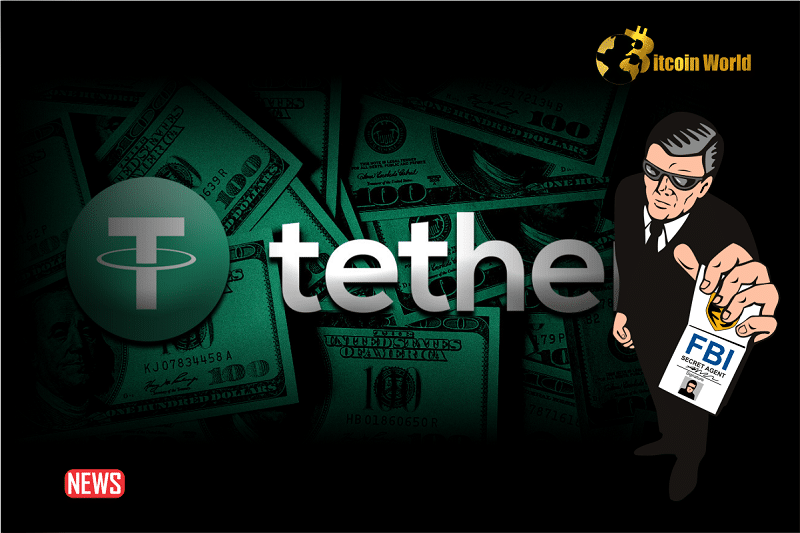In a bold move to clean up the crypto space, Tether, the issuer of the world’s leading stablecoin USDT, is doubling down on its fight against financial crime. Think of it as the crypto world’s sheriff teaming up with the big guns – the FBI and the Secret Service! This isn’t just talk; Tether is actively collaborating with these top US law enforcement agencies to make crypto a safer place for everyone. Let’s dive into how Tether is stepping up its game and what this means for the future of cryptocurrency.
Tether’s Commitment: Fighting Crime in the Crypto Wild West
- Tether, the powerhouse behind USDT, is boosting its anti-crime efforts in the crypto realm.
- They’re pledging full cooperation with the FBI and Secret Service, bringing in serious law enforcement muscle.
- CEO Paolo Ardoino is leading the charge, aiming to stamp out illicit activities involving USDT and bolster crypto’s integrity.
This isn’t just lip service. Tether has already taken concrete steps, like implementing a new wallet-freezing policy targeting individuals on the SDN list. This action alone led to the freezing of over 200 wallets. But now, they’re taking it to a whole new level by officially partnering with federal agencies.
In a recent letter addressed to US legislators, CEO Paolo Ardoino outlined his vision. He’s determined to prevent bad actors from using USDT for illegal purposes. A key part of this vision? Bringing on board law enforcement heavyweights like the Secret Service and the FBI.
See Also: Tether Froze 41 Crypto Wallets Tied to Sanctions
Tether’s Battle Cry: Zero Tolerance for Illicit USDT Use
On December 15th, Tether made their commitment crystal clear. In letters to the US Senate Committee on Banking, Housing, and Urban Affairs, and the US House Financial Services Committee, Tether detailed their unwavering dedication to fighting the misuse of USDT.
Tether isn’t just aiming for compliance; they want to build a robust and trustworthy crypto infrastructure. This means actively cooperating with law enforcement to combat everything from terrorist financing to other forms of illicit activities. They’re not just talking the talk; they’re walking the walk.
CEO Ardoino’s letter highlighted recent anti-crime efforts, emphasizing the new wallet-freezing policy. This policy has already helped law enforcement freeze access to over 200 wallets, locking down more than 3.5 million USDT. That’s a significant blow to criminals attempting to use USDT for nefarious purposes.
Tether proudly pointed to their collaboration with agencies like the US Department of Justice, the Secret Service, and the FBI. They cited this as a ‘tangible example’ of their commitment, revealing that they’ve assisted in freezing 326 wallets, totaling over $435 million to date! These numbers speak volumes about Tether’s proactive approach.
But Tether isn’t stopping there. CEO Ardoino announced in the letter a significant step: they have officially onboarded the US Secret Service and are actively working on bringing the FBI into the fold as well. This is a clear signal that Tether is serious about partnering with top-tier law enforcement to clean up the crypto space.
This proactive letter from Tether comes at a crucial time, especially after US Senators urged the Department of Justice (DOJ) to scrutinize the stablecoin more closely.
See Also: Tether Announces New Wallet-Freezing Policy, Is Your Wallet Safe?
Why the Scrutiny? US Senators Call for DOJ Action Against Tether
Before Tether’s recent moves, Senators Cynthia Lummis and Representative French Hill put pressure on the DOJ. They urged Attorney General Merrick Garland to make a “charging decision on Binance” and to “expeditiously conclude” investigations into Tether’s alleged role in illicit activities. This call to action was made in a letter dated October 26th.
The lawmakers alleged serious concerns: that Binance and Tether were actively providing resources and support that enabled crypto-funded terrorism. They claimed this was happening through the circumvention of sanctions laws and violations of the Bank Secrecy Act. These are heavy accusations, highlighting the pressure Tether has been under.
Furthermore, the senators claimed that Tether had failed to conduct adequate screenings, even with the knowledge that extremist groups were using USDT to facilitate terrorism and other illegal activities. This paints a picture of lawmakers demanding greater accountability from stablecoin issuers.
Tether’s proactive cooperation with law enforcement, spearheaded by CEO Ardoino, can be seen as a direct response to this increased scrutiny. They are facing a challenging period, navigating allegations of terror financing and working to regain trust.
We’ve already seen tangible results from Tether’s new policies. For instance, they successfully froze USDT held by the Ledger hacker, recovering over $600,000 in stolen funds. This demonstrates the real-world impact of their enhanced security measures.
Tether’s commitment to fighting crime is undeniably crucial for the crypto industry. At a time when illicit activities like terror financing and money laundering cast a dark shadow, their actions are a welcome step forward. It’s about rebuilding trust and ensuring crypto can be a force for good.
However, it’s also worth considering the potential long-term implications. Increased cooperation with centralized authorities could raise concerns about centralization within the crypto space. Finding the right balance between security and decentralization will be key as Tether and the crypto industry move forward.
Disclaimer: The information provided is not trading advice, Bitcoinworld.co.in holds no liability for any investments made based on the information provided on this page. We strongly recommend independent research and/or consultation with a qualified professional before making any investment decisions.




